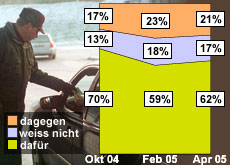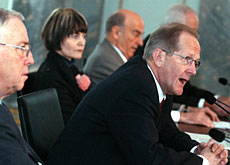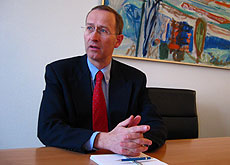Voters lean towards “yes” on Schengen

The Swiss look set to vote in favour of the Schengen/Dublin accords on closer ties on security and asylum issues with the European Union.
The latest poll by the Bern-based Gfs Institute, carried out on behalf of the Swiss Broadcasting Corporation, found that 62 per cent would back the accords if the vote were held today.
The Swiss electorate will decide on the issue on June 5, as well as a new partnership law for gays and lesbians.
The Schengen agreement permits free movement between signatory states by doing away with systematic checks on individuals at internal borders. The Treaty of Dublin regulates asylum issues between EU states and streamlines the asylum process.
Support for the bilateral agreements with the EU has risen by three per cent since the last poll in February. Those against dropped by two points to 21 per cent, and 17 per cent (one per cent lower) said they were still undecided.
The polling institute said the latest poll showed that the trend of people switching from the “yes” (70 per cent in October) to the “no” camp had ground to a halt.
Opposition to Schengen/Dublin is being spearheaded by the rightwing Swiss People’s Party, which is against closer ties with the EU.
Government approved
The Swiss government signed the accords in Luxembourg last year and they were approved by parliament in December. However, the People’s Party was able to force the vote by collecting enough signatures at the end of last month.
Those polled by the institute followed party lines. Among supporters of the centre-left Social Democrats, 86 per cent said they were in favour, while the figure was 77 per cent and 67 per cent for supporters of the two centre-right parties, the Radicals and Christian Democrats.
In contrast, only 62 per cent of People’s Party voters said they would follow their party’s line and reject the accords.
There was little difference between the language regions. The majority of German speakers (63 per cent) and voters in French-speaking cantons (61 per cent) both threw their support behind the accords.
Only Italian speakers (who make up around seven per cent of the population) were less certain about the benefits of the EU deal, with only 43 per cent saying they would vote in favour.
Homosexual rights
For the first time, the institute included the partnership law in its questionnaire. Under the new law, gay couples would be able to register their partnerships, and they would be granted the same rights as heterosexual couples in terms of pensions, insurance and taxation.
Two-thirds of those polled backed the new law, 24 per cent were against and ten per cent were still undecided.
French-speakers were decidedly less in favour than their German- and Italian-speaking countrymen and women, with a slim majority (53 per cent) supporting it.
There was also a discrepancy between urban and rural voters. Nearly three-quarters of those polled in cities said they supported the new law, but the figure was lower in towns and villages (68 per cent) and dropped to 56 per cent in the countryside.
There was a marked difference along party lines. Social Democrats and Radicals spoke out overwhelmingly in favour (80 and 79 per cent respectively), while People’s Party supporters were divided at 50 per cent, and only 47 per cent of Christian Democrats were in favour.
swissinfo, Christian Raaflaub
The results of the latest poll by the Gfs Institute:
Schengen/Dublin: 62% yes, 21% no, 17% undecided.
Partnership law: 66% yes, 24% no, 10% undecided.
45% of registered voters said they would go to the polls on June 5.

In compliance with the JTI standards
More: SWI swissinfo.ch certified by the Journalism Trust Initiative




You can find an overview of ongoing debates with our journalists here. Please join us!
If you want to start a conversation about a topic raised in this article or want to report factual errors, email us at english@swissinfo.ch.